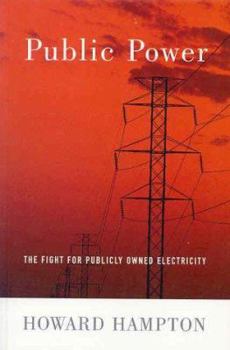Public Power
Deregulating electricity prices and privatising publicly owned power system assets has been an economic disaster in North America and elsewhere. Instead of the promised abundance of lower-priced... This description may be from another edition of this product.
Format:Paperback
Language:English
ISBN:1894663446
ISBN13:9781894663441
Release Date:January 2003
Publisher:Insomniac Press
Length:304 Pages
Weight:0.30 lbs.
Dimensions:0.8" x 5.9" x 9.2"
Customer Reviews
3 ratings
An Interesting Read for All consumers of Electricity
Published by Thriftbooks.com User , 20 years ago
In a downright easy to read manner, Howard Hampton describes the beginings of the North American Electricity markets and the ensuing political gamesmanship that occured at the turn of the century from a historical perspective, then combined with insight and dedicated following guides the reader to the present, where Mega-Corporations control the buying and selling of wholesale electricity between themselves and other jurisdictions.Without having to specifically 'Name Names' Howard is able to describe the process that delivers one of the world's most abundant, yet most critical resources, Electricity.He describes how we as North AMericans have been having it relatively comfortably being generated as a 'Overabundant' Supply product that is available for every citizen of an area, then how the Marketers and other 'For-Profit' entities have seen fit to begin the march down the road that 'privatization' will bring.Currently, In January 2004, with a New Government in Ontario wrestling with the 'Hydro Monster' is no easy task, but Howard and his book have broght to the forefront how important this resource is, not only to Ontarians, but to others in both the developed and developing worlds.
Conservation and Energy Efficiency Is Important
Published by Thriftbooks.com User , 20 years ago
Howard Hampton may be the only politician who understands the importance of energy efficiency and conservation as part of the public power solution to Ontario's electricity crisis.
An absorbing history of the electricity industry
Published by Thriftbooks.com User , 21 years ago
It is surprising that a book about the electricity industry, let alone one written by a politician, could be so absorbing, informative and even inspiring. Public Power tells the story of the North American electric utility industry and how it has evolved over the last 100 years. The story begins in Ontario, Canada, where the idea of publicly-owned electrical utilities first took root in the early years of the 20th century under the direction of the remarkable Sir Adam Beck, whose 1917 testimony to the U.S. Congress on the success of Ontario Hydro helped fuel the American public power movement. The book then vividly chronicles the struggle between private and public power in the United States. Leading roles in the narrative are assigned to Franklin D. Roosevelt, who established the New York Power Authority and the Tennessee Valley Authority, Samuel Insull, who died penniless after his mammoth utility holding company collapsed in an Enron-like implosion in 1932, and former Cleveland Mayor (and now Presidential candidate) Dennis Kucinich, who courageously sacrificed his political career in 1978 rather than sell his city's publicly owned utility. Also part of the story: Clint Murchison, the Texas oil and gas magnate who caused a political crisis in Canada in the mid-1950s when he tricked the Liberal government into publicly financing his privately owned Trans-Canada natural gas pipeline. Much of the latter part of this highly readable book is devoted to explaining the failure of electricity deregulation and privatization, which began in Gen. Augusto Pinochet's Chile and later Margaret Thatcher's Great Britain under the tutelage of Nobel Prize-winning U.S. economist Milton Friedman. After telling the story of how Thatcher's policies led to the chaos and foreign control of Britain's electricity industry and the bankruptcy of nuclear giant British Energy, the book explains the geopolitical and nuclear origins of the U.S. deregulation movement, from Richard Nixon to George Bush. The failure of utility deregulation in the U.S. is told in fascinating detail, with particular emphasis on California, Montana and Pennsylvania. Also explained are the disastrous "me too" deregulation experiments in the Canadian provinces of Alberta and Ontario, where Hampton, Ontario's former Attorney General, now leads the opposition New Democratic Party. Hampton's lucid analysis of why electricity deregulation has failed to live up to its promise is very persuasive. So is his argument that public ownership of utilities is better for the economy and the environment. Both should be studied by anybody who assumes that 1) competition will inevitably lead to lower costs and 2) government ownership is inherently less efficient than private ownership. In the utility sector, at least, the evidence shows otherwise. The book concludes with an eloquent vision of a 21st century public power system that is both technologically and economically feasible, and environmentally sound. Hampton





